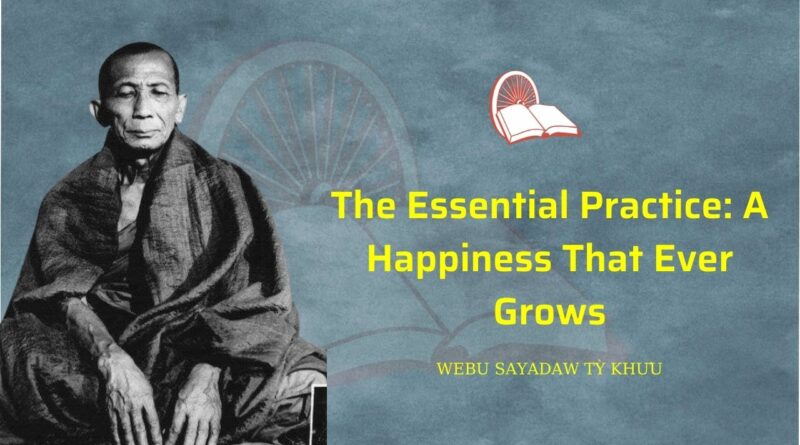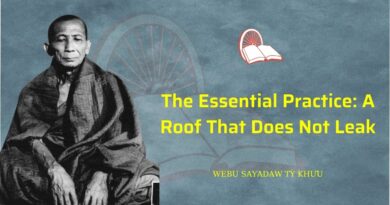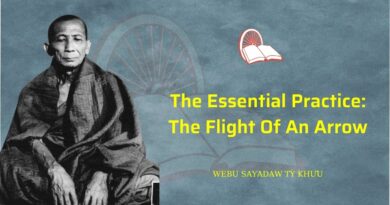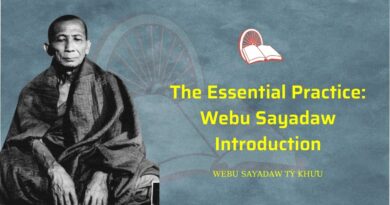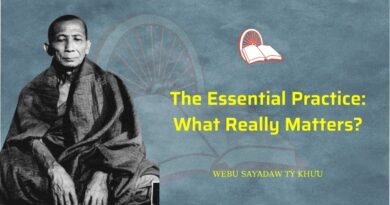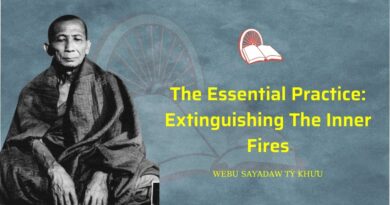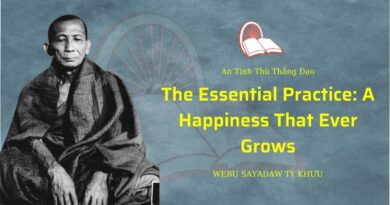Work Without Wavering!
WEBU SAYADAW: You have taken the precepts. Now that you have undertaken the practice of the perfection of morality, fulfill it.
What you realize when you penetrate the Four Noble Truths is called “Bodhi,” awakening. You are born at a good time and in a good form of existence. Now then, emulate the wise disciples of the Buddha and put forth effort as strong as theirs, so that you may attain the awakening to which you aspired. Those who received the teachings from the Buddha himself worked ceaselessly in all four postures sitting, standing, lying down and walking — and thus attained enlightenment. The human beings, Devas, and Brahmas who achieved their aspiration for awakening on just one occasion cannot be counted in hundreds, thousands, hundreds of thousands, or millions. Sometimes in one split-second an incalculably large number of beings achieved their aspirations. From the time the Buddha attained full awakening, beings have been able to attain Nibbana. But it is not only during the lifetime of the Buddha that beings can attain Nibbana. Nibbana can be attained as long as the teachings of the Buddha are available.
The attainment of Nibbana is not bliss just for a brief moment. It will have lasting effects for the rest of the round of birth and death, samsara. What the Buddha taught is the way out of suffering. You don’t have to know a vast amount. If you practice one technique properly with strong and steadfast effort, you will come to know for yourselves that you are people of great strength. You will not have to ask others about the teachings, and you will not even have to tell others that you are practicing.
Once you have established effort, you will not only know what good teachers told you, but you will clearly know for yourselves how the viriya iddhipada factor[4] arises in a split-second. You do have the fortune of being able to follow the good advice of the Buddha as his disciples did in the past.
When I increase effort, then the viriya iddhipada factor will increase also. And then what will happen? I will think: “With just this much effort, the viriya iddhipada factor has arisen to this extent. But my energy is not exhausted yet. There is still more. I shall increase my effort further. And the will to increase effort will arise. At this same instant effort increases. As effort increases the viriya iddhipada factor becomes stronger. When these factors have thus arisen to a very high standard, then all your aspirations can be fulfilled.
Do not take rest. Do not take breaks or time off. Work continuously. If you develop continuously, you will become happier and happier. In this way the disciples of the Buddha became very happy, never getting enough of this happiness. Do you understand?
If a king rules over a country, does he say complacently, “This one country is sufficient for me”?
DISCIPLE: No, sir, he doesn’t remain satisfied.
SAYADAW: And if he rules a whole continent and has become emperor, is he satisfied then?
D: No, sir, he isn’t.
S: If he isn’t satisfied, what will he do?
D: He will try to acquire more and more territory, sir.
S: When a man is emperor over a continent, he wants the whole world. When he gets the whole world, he wants to become a universal monarch.[5] Once he is a universal monarch will he say, “This is enough” and be satisfied?
D: No, sir, he will not be satisfied.
S: All those who are perfect in their faith and have performed the highest form of generosity and demonstrated the greatest form of respect can’t be satisfied. They will practice meditation and will gradually attain the stages of absorption (samapatti). Once they are capable of entering into the states of Nibbana, only this happiness will count for them.
Nibbana is the highest and noblest form of happiness there is. One can never experience enough of the highest and noblest form of happiness, it is said. And not only the direct disciples of the Buddha were able to achieve it; if you put forth continuous effort to the same extent that the wise of old did, you too will experience this highest happiness, even now. Then you will know: “I experienced a happiness that doesn’t last only for a moment, or just for a lifetime, but for the remainder of my time in the cycle of birth and death. And why did I attain this happiness? Because I was born into the right form of existence, because I was born at the right time, because I put forth strong effort.”
At any time, when human beings, Devas and Brahmas accepted and practiced the teachings, they were successful. In this context, “at any time” means that whenever one undertakes this practice, he obtains understanding. The time span in which the teachings of the Buddha are available is very important and special: if you want to attain Nibbana you can, at any time. Even now it is easy.
Don’t say, “This is not my cup of tea,” or “This isn’t suitable for me,” or “I won’t get anything out of this.” You do have noble aspirations and you can fulfill them now. So if you say to yourselves, “I shall take up the practice right now,” don’t you think you can get real understanding? You can get it practicing in a group or by yourself. Seek for yourself. Take up one of the techniques that the Buddha taught and practice it with one-pointedness and strong effort. Establish awareness of the in-breath and out-breath and the spot where the air touches while breathing in and out.
When you are thus aware of the spot, can there still be worry, anxiety and fear? Can there still be greed, aversion and delusion? And when you concentrate your mind in this way, you revere the teachings, don’t you?
D: Yes, sir.
S: You will understand that the degree you come out of suffering depends on how much effort you put in and on how strongly the viriya iddhipada factor arises out of this effort.
D: We understand, sir.
S: There will be no more room for doubt because you have now practiced the technique and experienced it for yourselves, and so you know it. You will think, “Even in such a short time I am able to come out of suffering immediately to such an extent, but my strength is not yet exhausted.” And the will to exert still more effort arises, and you will become happy with a happiness of which you will never tire.
Now tell me. There is such a thing as a universal monarch in the world, isn’t there?
D: Yes, sir, there is.
S: When the time is right for a universal monarch to arise, will no one notice this fact?
D: We don’t know, sir.
S: About a hundred years before the universal monarch arises the good news goes around and a commotion arises. Then all set their hopes on the universal monarch and yearn for him. They are happy, and when he is born they rejoice. What are the circumstances necessary for a universal monarch to arise?
D: Only when the “jewel of the wheel”[6] arrives, can someone become universal monarch.
S: Yes, before the universal monarch wheel-jewel arises he is called an embryonic universal monarch, but even then his authority, wealth and power are considerable. Will he say, “Let the universal wheel-jewel not arise, what I have got is quite enough for me”?
D: No, sir, he won’t.
S: And why not?
D: Because he wants to become still greater through the arisal of the wheel-jewel.
S: So, when will the wheel-jewel come?
D: It will come at the right time, sir.
S: The wheel-jewel arises due to the merit the embryonic universal monarch has accumulated. But there are still duties for him, and having understood these duties and keeping them in mind, he has to fulfill them.
Now, say there is an embryonic universal monarch. His merit is ripe, but he doesn’t fulfill the duties that are the final cause for his becoming a universal monarch. Will the wheel-jewel arise of its own accord?
D: No, sir, it will not arise by itself, I think. He will have to exercise himself further.
S: Now let’s say you were the embryonic universal monarch waiting for the wheel-jewel to arise so that you will reign over the whole world. You will still have to practice further. You have to keep precepts. But would you say, “Well, I don’t need the wheel-jewel anymore. I am quite satisfied with the riches and splendor I have attained”?
D: No, sir.
S: You will not give up at this point, because if you become a universal monarch you will be able to reign according to the Dhamma so that the whole world will be happy. Do you think the people of your provinces will say to you, “O embryonic universal monarch, you have got enough power”?
D: No, sir, certainly not.
S: So, what will the people say?
D: “Work hard and fulfill your duties,” they will say, sir.
S: And why this?
D: Because they want the wheel-jewel to arise, sir.
S: Yes, you see, because of the power of the wheel-jewel of the universal monarch, all will experience many different types of happiness. But when one has become a universal monarch, will this give him results for the rest of the cycle of birth and death? How long can he be a universal monarch?
D: Only as long as the wheel-jewel is there, sir.
S: Yes, even a universal monarch can be on his throne at best for one life-span. But now the Buddha’s teachings are available. If all the good beings who have taken birth in a happy existence take up the practice of the Buddha’s teachings, they can attain even to awakening, as they aspired. But it is as with the embryonic universal monarch: he doesn’t become a universal monarch just enjoying the royal splendor that he has already achieved; he will only become a universal ruler when he has fulfilled the duties and disciplines necessary to obtain the wheel-jewel.
Now, when do you want to attain Nibbana?
D: Very soon, sir.
S: What does that mean?
D: Now, immediately, sir.
S: So, you are going to obtain it right now?
D: If it’s possible, sir.
S: Well, at the time you accept it, you will reach it.
D: One can get it only when the ten parami (perfections) are completed, sir.
S: You still don’t understand. We were talking about the embryonic universal monarch just now. He attained that point because of his fulfilling the ten parami. This fulfillment of the parami means that he can become a universal monarch for certain. But when will he become a universal monarch? When he has fulfilled the practices and duties that cause the arising of the wheel-jewel. So, if he undertakes these, the jewel will arise. Now, don’t you tell me you want Nibbana? If you practice now, you will realize it now. Will you take up practicing? But then don’t get up after some time and run away.
If you want to become a sovereign ruler, what do you have to do? You have to master all the arts that are required of an accomplished prince and princess. So what do you think you have to master as sons and daughters of the Buddha?
D: We have to master morality, concentration and wisdom, sir.
S: What do you have to do to become a king? You have to study and practice the eighteen arts a king has to master. You have to learn about war-elephants, strategy, how to overcome enemies, and so forth. Once you have learned all this, what will you do when you encounter enemies?
D: We’ll attack them, sir.
S: There are enemies who obstruct our progress towards Nibbana, and if we want to get there, we have to fight them. Will you fight them after having equipped yourselves with weapons?
D: Yes, sir.
S: You will have to sit for a long time. Once the battle starts, you will have to fight for real. Once you have deployed your troops in the battlefield, you will have to go ahead. Only if you prevail will you become a king.
D: We shall fight, sir.
S: Good, go ahead. Don’t get up and run away, even if time seems long. If you fight well, you will become sovereign king.
During the time of the Buddha, people learned the teachings from the Buddha himself. The Buddha simply taught how to defeat all forms of ignorance. Do you think that all those who listened to his words and then practiced accordingly repulsed ignorance? They really refuted all forms of ignorance and therefore they were victorious. They attained supreme happiness. Establish yourselves in effort and all your aspirations will be fulfilled. You are well equipped with weapons for the battle, aren’t you?
D: Yes, sir.
S: And you will fight, won’t you? Your enemies do attack and they attack often and with full force. Are sloth, torpor and laziness friends or foes? What do you do when they come? I think it has been some time that you haven’t fought a battle?
D: Quite some time, sir.
S: Tell me about the weapons you will have to use, and how you have to fight.
D: We have to fight for one hour every day, sir.
S: Only one hour a day?
D: We can’t even always manage that much, sir.
S: Look here! Is this because the weapons are soft or because the warriors are soft?
D: We are soft, sir.
S: Are princes and princesses who want to become rulers soft too?
D: No, sir. They can’t be because soft princes are defeated.
S: But these princes here, are they people with strength and fortitude or are they soft?
D: We are soft, sir.
S: As sons and daughters of the Buddha do you want to become sovereigns of Nibbana or do you want to remain princes and princesses?
D: We all want to become rulers, sir.
S: So, the weapon you have is good; attack! But only if you hold the weapon properly will the enemy fear you. I think you don’t hold the weapon properly.
D: We do attack, sir, but our way of attack is weak. Out of compassion give us a powerful weapon, sir.
S: I can only give you the weapon. This weapon will not do anything; only if you take this weapon and make use of it can you win. No weapon is weak, and you don’t have just one. You have a whole store of weapons. If I were to enumerate them, it would become a long list.
D: Sir, we fail because we have so many weapons.
S: No, it’s because you don’t fight. You have to fight. Do you understand? Don’t you want to become sovereign kings? Do you want to stay princes and princesses?
D: We try hard, sir, but we never succeed.
S: Yes, yes, but the weapon is fine. You don’t understand because you don’t fight. You are talking like most. You meditate, you put forth effort, but in spite of that you sound as if there was no effort. There is so much energy in you, but you don’t use it. You do have energy. If you put all your stock of energy to use, you will assuredly become real sons and daughters of the Buddha, become kings by attaining Nibbana. Sons and daughters of the Buddha have the ability to accept instructions, make effort, and follow the teachings of the Buddha. All who practice the teachings, be they humans, Devas or Brahmas, can fulfill their different aspirations for Nibbana. Even if you keep up the awareness of in-breath and out-breath throughout only one day, you will understand much. You may say that you have been meditating for so many years, but have you really ever been able to keep your mind focused for a full day?
D: No, sir.
S: By one day I mean a day and a night, twenty-four hours. Now do this: practice the teachings of the Buddha to the full for one day and one night. If you have done this once, you will all be able to appreciate the value of just one single day. Some of you may have been practicing for twenty or thirty years and some even longer. But just examine yourselves. Have you really, having established yourselves in complete effort, fulfilled one single day in practice? Have you?
D: No, sir, we haven’t.
S: And why have you never devoted yourselves fully for one whole day? You do have the energy required, don’t you?
D: Yes, sir.
S: You don’t use the energy you have in the right place. You waste it for no purpose. Are you still going to shows and entertainments?
D: Yes, sir. We watch the pwe all night until dawn, without sleeping.[7]
S: How many nights in a row do you do this?
D: About two or three nights, sir.
S: How many shows have you seen in all?
D: I can’t remember, sir.
S: You see; there you have plenty of energy. Day and night. There your effort is strong. Now, how many times have you observed the Uposatha precepts?[8]
D: Many times, sir.
S: I mean, how many days have you observed the eight Uposatha precepts day and night?
D: We have observed them ever since we were children, sir.
S: How many days all together? A day I call a day and a night, twenty-four hours. Do you get a full day of Uposatha observances, if you look at it like this?
D: No, sir, we don’t. We observed them about half a day at a time, sir.
S: Have you fulfilled them to the utmost during the half-day?
D: We are unable to do that, sir. We started this morning, sir, and shall keep it up until tomorrow.
S: You do have the will to work, but you don’t usually use it for this noble purpose, but rather to watch pwe. If you die while watching a pwe, where will you go?
D: To the lower world, sir.
S: Do you want that?
D: No, sir.
S: Even if you don’t want it, it has great power over you, doesn’t it? If you were to really observe Uposatha, with full effort for a whole day, could you not then fulfill your aspirations? If you keep up the practice for one Uposatha day, you will understand, you will come to know something.
The real disciples of the Buddha take the precepts on Uposatha days, and then they immediately take the object and firmly keep their attention fixed on it. Now if your attention is so firmly fixed on an object, can sloth, torpor or laziness disturb you?
D: No, sir, they can’t.
S: If your attention is firmly established on the in-breath and out-breath and the point of contact, do we still hear other people’s conversation?
D: No, sir.
S: What if someone speaks very loudly?
D: It doesn’t disturb us, sir.
S: There is no wanting, aversion or delusion. If our minds are thus purged of greed, aversion and ignorance, will there still be loneliness, depression and laziness?
D: No, sir.
S: Are we still missing company?
D: No, sir.
S: Do we still want to know what others are saying?
D: No, sir.
S: If someone comes and invites us out, are we excited?
D: No, sir.
S: We shall not jealously guard what we have got. Good people are not like that. We share it with those with whom we live: “May they also get what I have got.” Now, what will happen if all establish strong effort from sunrise to sunset, without a break? This is a long time-span, from sunrise to sunset. But will you feel it to be long?
D: No, sir.
S: “Today the time went so quickly! We observed Uposatha and the time just flew! And I really don’t know why this day was so short.” And after sunset you will again establish awareness of the object and then day will break and you still continue with the awareness of the spot below the nose, above the upper lip until it is light. Without interruption. And you will wonder, “This night passed really quickly; now it is day again!”
This is how they used to practice on Uposatha day. When the direct disciples of the Buddha undertook to practice for a day, they practiced for twenty-four hours. And when day came, they were still not satisfied and said, “In the long cycle of birth and death we have been doing all those other things for a long time, but not this.” And they continued their work without wavering. Do you have days like this?
D: Our days contain some interruptions, sir.
S: If someone keeps Uposatha, and his mind wanders here and there — just anybody, I don’t mean you — so his mind flits around here and there. But he is at a pagoda or under a holy Bodhi tree, and say he dies at that moment. What will happen to this worshiper?
D: He will go to the lower worlds, sir.
S: How many lower planes are there?
D: There are four lower planes, sir.
S: What are they?
D: Hell, the animal world, the plane of the hungry ghosts, and the demon world.
S: Now, who wants to go to hell or the animal world?
D: I don’t, sir.
S: What about the ghost world or the demon world?
D: I don’t want to go there, sir.
S: If you take the precepts and then don’t firmly put your mind to observing the teachings of the Buddha, is that skilled or not?
D: It is unskillful, sir.
S: If someone observes the Uposatha without keeping his mind focused, where will he be reborn when he dies?
D: In the lower planes of existence, sir.
S: Are you sure?
D: Yes, sir, I’m sure.
S: If I talk about someone who doesn’t keep his mind fixed on the object, I am not talking about you people; I’m talking about that (fictional) worshiper.
D: Sir, out of compassion show us the good road out of the lower worlds.
S: Do you remember how you focused your mind as the Buddha taught?
D: Yes, sir, I remember.
S: So then, let us keep the mind on the spot. What do you think?
D: Yes, sir.
S: But of course, now you can’t do a full day anymore. But if you practice until it is light, you will have done half a day. What do you think?
D: We will keep our minds at the spot, sir.
S: What other things do you have to do tonight?
D: There is nothing to do at night, sir.
S: You have eaten, so you don’t have to cook anymore, and there is nothing else to do. Very good. Will you stay here now that you have undertaken to keep Uposatha? Won’t you want to go away?
D: We shall do our best, sir.
S: If you say, “We shall do our best,” will there be no disturbances coming in? Will no enemy attack? Only if you really mean it are the enemies afraid. If you are firm, they run. You know about Mahakassapa, don’t you?[9]
D: Yes, sir, we have heard about him.
S: He met the Buddha and then practiced what the Buddha taught in order to escape from suffering. There are four bodily postures: sitting, standing, walking and lying down. Which of these is prone to let in the enemy? Laziness and sloth come in while lying down, and they come to stay, don’t they? If we indulge in laziness and sloth, will we be able to develop in morality, concentration and wisdom?
D: No, sir, we won’t.
S: Laziness and torpor are our enemies. Therefore Mahakassapa rejected the one posture in which the enemy attacks and adopted the other three postures in which the enemy can’t remain for long.
There are thirteen ascetic practices and Mahakassapa practiced all thirteen. Only those among the disciples of the Buddha with the strongest determination practiced the sitter’s practice, i.e., did not lie down for twenty-four hours a day. If one takes up the sitter’s practice and makes the strong determination not to sleep, this sloth and laziness can’t overpower him. Though these noble disciples of the Buddha neither lay down nor slept, they lived long and were very healthy. Do you fight wars?
D: Yes, sir, we do.
S: Now, you are going to start your meditation. What preparations do you have to make?
D: We have to spread out our mat.[10]
S: If you spread out your mat before starting your meditation, soon someone will come along. Who do you think that will be? Do you think laziness and sleepiness will come your way?
D: If they come, sir, I shall lie down and sleep.
S: What will you say to them?
D: I won’t say anything, sir.
S: You will say, “Ha, now only you come, I’ve got the mat ready a long time ago.” And what are you going to do then? You are going to lie down flat on your back and sleep. If you do this, will you be able to fulfill your aspiration for Nibbana?
D: No, sir.
S: If you practice without sleeping, you are establishing full effort and are always keeping your attention firmly fixed on the object, day and night. If you practice in this way, your morality, your concentration and control over the mind, and your insight and wisdom will become stronger and stronger. They will develop from moment to moment.
If you watch at show all night, you will feel tired in the morning. But if you practice the teachings of the Buddha all night, you will experience happiness and joy without end, and you will not feel sleepy. Do you understand? This the Buddha taught — it is not my teaching. If you follow the teachings of the Buddha and don’t rest until you have understood them completely, you will really know.
If people tell you, “This shade is cool,” don’t simply believe them, but try it out for yourselves. If you just repeat, “It is cool, it is cool…” because others say so, you don’t really know about its coolness; you merely talk about it. If someone just babbles along, he doesn’t show appreciation. But if someone speaks from experience, then will he not be able to speak with deep appreciation, and radiant happiness, and love?
So pay attention and practice. If you practice, you will reach your goal. Not just hundreds, not thousands, not ten thousands, not hundreds of thousands — all who follow the teachings will master them.
When you start to meditate you still have to check: Is everything arranged? Is there a place to sleep at night, and to rest during the day? Only when all this is in order, will you meditate, isn’t it so? If you act in this way, you nurture your enemy, you call him a friend, you love him. Once you recognize your enemy as such, do you still associate with him?
D: No, sir.
S: What do you do, if he comes?
D: We check him and defend ourselves.
S: How do you defend yourselves? Will you attack him? Will you mount a full attack?
D: We shall repulse him, sir.
S: How do you repulse him? Softly, so that he doesn’t get hurt?
D: We shall ward him off immediately so that he can’t ever come back.
S: Yes, carry on. Cut him off and throw him overboard so that he can’t ever come back. Well then, what will you do when tiredness and laziness really arise?
D: I shall probably fall asleep, sir.
S: What about others in the audience?
D: I don’t know, sir.
S: Will you recognize the enemy and destroy him?
D: Just so, sir.
S: Very good. I shall give you a simile. If a man has fallen into a deep sleep and you wake him up, he will wake up quickly. If you try and wake up someone who pretends to sleep, you will not be successful. Why is this so?
D: The more one works on him the more he pretends to be asleep.
S: Yes. Now what about you, are really fast asleep or do you pretend to sleep?
D: I don’t know, sir.
S: If you are really asleep, you will simply get up, when I wake you up. Will you get up?
D: Yes, sir.
S: Yes, and after getting up, you will go back to sleep, I think. But I’m not sure about that. I only think so.
D: I shall work hard as you instruct me, sir.
S: Put forth effort and you will become perfect. You have all you need.
All of you have acquired the elements of insight and renunciation. Because of this, you now esteem the teachings of the Buddha, you want to fulfill and practice them. If the accumulation of the perfection of renunciation is small, your ears will be blocked to the teachings of the Buddha. For instance, if somebody tells you to come to this place, you don’t want to come because you are bored by this. But now you are attracted by this teaching. All you need now is the same amount of effort that the noble disciples of the Buddha made.
When you begin to practice you may worry, “If I sit for one or two hours I am aching and stiff. How can I possibly sit for a whole day and night? I think that’s quite impossible.” Don’t you worry like this?
D: No, sir, I don’t.
S: Though you may not worry now, it will come up. But don’t worry in this way. The Buddha didn’t teach suffering. He taught the way leading to happiness. You may not believe this because you think your own thoughts. But you have to work with full effort and without wavering. Now, when you meditate with full effort, the viriya iddhipada factor will arise. You will understand this. But when you sit all of you feel some discomfort, don’t you?
D: Yes, sir, we do.
S: Even if you are aching and stiff, there is a place where there is no pain. There is sleepiness, and there is also a place where there is no sleepiness. What do you do when you are drowsy?
D: I go to sleep, sir.
S: Do you ever get enough sleep?
D: Yes, sir, I do.
S: But you sleep every day, and now want to sleep again? So you haven’t actually had enough yet. If you sleep every day, you will never get enough sleep. So when you feel sleepy, make an effort to reach the place where there is no sleepiness and then you will need no more sleep. Get up and walk up and down. Keep your attention at the spot where the air touches when you breathe in and out. If you keep it fixed on this spot with full effort, at some time you will find the place of no sleep. There is no “I shall not find it”; there is only a “I haven’t got there yet.” You will get it.
If you sleep and postpone meditation until you are rested, you will wake up when it is light and there will be no time left to meditate. I am just telling you what the Buddha taught. There is nothing I know. All the Buddha taught is true.
All of you have to make a living, work, toil, and shoulder burdens, don’t you?
D: Yes, sir.
S: So let us be simple. You breathe, don’t you?
D: Yes, sir, we do.
S: So, simply be aware of the in-breath, the out-breath and the point below the nose where the air touches. It goes in and out without interruption, doesn’t it?
D: Yes, sir, that’s right.
S: Only when your attention wanders away, the continuity is broken. Don’t allow your attention to follow the breath. Your attention should always remain with this small spot. When you keep your attention there at the spot, your respiration will become soft and subtle. Once it has become subtle, you don’t have to make it rough again. The Buddha didn’t say that we should make the subtle rough. When you feel the spot, touching it with your finger, your attention will not wander to other objects. Can’t you fix your attention firmly on the spot with the breathing?
D: I can, sir.
S: Will greed, aversion and delusion still arise when your attention is focused on the spot? When you are well concentrated, even for a short moment, your mind is cleansed of greed, aversion and delusion for that short moment. Can’t you keep your attention fixed on the spot for a longer time-span?
D: Yes, sir, I can.
S: So, make a strong effort and keep your attention there. If you keep it there, is there any drowsiness or laziness disturbing you?
D: They don’t come up, sir.
S: But what will happen if you reduce your effort?
D: Laziness will come in, sir.
S: Sloth and laziness will come and your concentration will become weak. This is because you’re at the beginning; later it will improve. If you view this laziness as a friend, not as an enemy, you will get used to it. Though it comes you will not get lazy anymore. When we feel sleepy, we say, “This is good. Now I want to find the place where one doesn’t feel sleepy quickly. Then there will an end to sleeping.” Work, fix your attention firmly on the spot as I just instructed you and when your limbs ache, know: “The only way out of this is to get to a place where there is no pain.” Now, if the discomfort becomes very intense, is it too difficult then? It is not difficult. Don’t worry about all this. Simply keep your attention on the spot. Put it back on the spot. Don’t allow it to go away! If it runs away, you will never get to the place I just told you about.
Though we can’t avoid being offered food and having to eat it, don’t you think that we can keep our attention at the spot and eat? Do you think you will pass comments like, “Too much salt, too little salt,” about the food that your wife, daughter, grand-daughter, brought from home?
D: I wouldn’t comment, sir.
S: Do you think you would even notice that the food has too much salt?
D: No, sir.
S: Why? Because you are aware of something far better, so you don’t notice their food. If you get upset and angry about food, even though you are observing the eight precepts, and you die at that moment of anger, where will you go?
D: To the lower worlds, sir.
S: If you work with proper effort, not just superficially, will you even know whether the food tastes good or not?
D: No, sir.
S: Keep your mind steadfastly focused on the spot. Your daily work needn’t suffer. It doesn’t cost you anything. Others won’t know about it. Will you practice the sitter’s practice tonight?[11] Keep your attention on the spot and you will find it very easy. If you feel drowsy, of if you are aching, say: “Good, it has come early,” and then concentrate still harder on the spot.
If you reach the goal before drowsiness and discomfort come up, so much the better. If these disturbances don’t manifest, don’t stop working, thinking, “If they don’t even come up now, there is no need to work to get to a place where they don’t exist.” Just keep working.
Will you undertake the sitter’s practice? Or will you, when sleepiness and tiredness set in, change to another (of the four) postures and reduce your effort?
D: We won’t reduce our effort, sir.
S: All of you, or just a few among you?
D: All of us, sir.
S: So, if you keep each other company, so much the better. Now, then, undertake to carry out the sitter’s practice! Make it a firm vow!
You may think, “It wasn’t right that we just gave in to sleepiness in the past.” Well, now you have undertaken the sitter’s practice, and I think it is for the first time.
D: Yes, sir, the first time.
S: This is the weapon. With this weapon you can fight your battle. With this weapon you will be victorious. If you fight with a pillow as a weapon, you cannot win.
I shall tell you a story you probably already know. At the time of the Buddha, there was a rich lady who owned a big estate. When she became old, she distributed the inheritance amongst he children. But the children, after receiving the money, didn’t care for their mother anymore. She was not treated well in the houses of her sons and daughters and she was in distress.
When she was about eighty or ninety years old, the neighbors had her ordained as a nun, as they couldn’t bear to see her poverty and suffering. When the nuns of her nunnery were invited for alms food to a house one day, they all went. Only Sona Theri, our old woman, had to stay back because she was too old to go along.
Before they left the nunnery, they said to Sona Theri, “You are very old, you can’t come with us. But fill the water pots for drinking water, and those for washing hands and feet, so that everything is ready when we return and also prepare some hot water.”
But this nun was very old. To carry the water she had to use a small pot, and as she was working away, she got very tired. But she didn’t rest. She forced herself to do what she had been ordered to do. Because she overworked herself, she fell down between the water pots and couldn’t lift herself up anymore. She didn’t pretend; she was exhausted from carrying water.
She had been given the teachings of the Buddha. So she thought: “Well, I can’t fill the pots anymore. There is more water to be carried and I haven’t prepared any hot water yet either. But I can’t even get up. I will take up an object of meditation given by the Buddha.” And she started meditating as we did. She fixed her attention firmly on the spot. She focused her attention so that it stayed there, whatever happened. That’s all. And as she was meditating with strong effort, she did what had to be done and made an end to suffering.
Of course she was full of the bliss of emancipation. When the others came back, they couldn’t find her. They said, “Where could this old nun have gone?”, and they looked all over the nunnery. Eventually they found her lying between the water pots, and they all gathered around and abused her. “Now what about our orders? She didn’t fill the pots, and there’s no hot water either. She is so lazy that she just lies down and sleeps.”
But the old nun was absorbed in bliss. The other nuns were worldlings, of course, and they stood there blaming her. “Look how lazy she is. No water pot is full, no hot water. Just lying around!”
You too can talk like that, can’t you? It’s not pleasant talk. But this nun was an arahant. She had attained Arahatship along with the supernatural powers. She said: “All you desire will be done. There will be water in the pots and there will be hot water too.” And after saying this, she made a strong determination and the water pots were filled to the brim and the hot water was boiling over.
This nun was very old, and in exhaustion she fell down and could not get up again. She practiced as you are doing now. Do you hear this? How long will it take you to reach the goal, you who are healthy and strong?
D: We shall work hard.
S: Will you still say, “Oh, we are old, we can’t practice anymore”? Sona Theri was eighty or ninety years old and she still carried water as she had been told. When she fell down in exhaustion she just meditated. The disciples of the Buddha attained the goal because their power of effort was great.
You have the teachings, the technique. All you need now is effort. And why do you need effort? Because during meditation the enemies will come to disturb you. Keep your attention on this small spot. If your limbs ache, work that you reach the state where there is no aching. When you are drowsy, work that you reach the state where there is no drowsiness. Good, good. Establish effort and meditate, work to make an end to all suffering.

